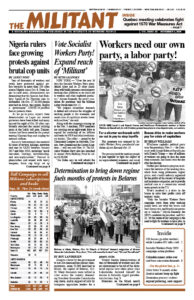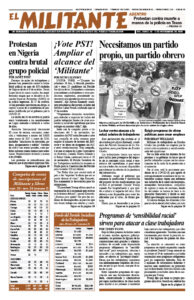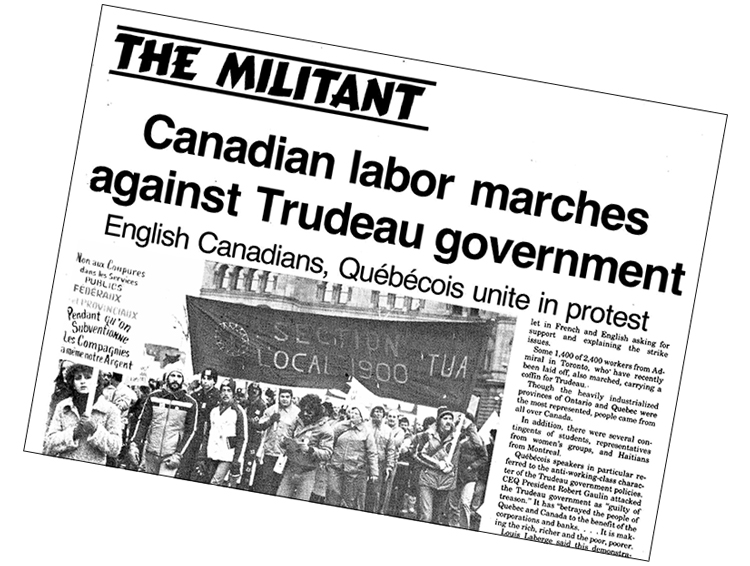MONTREAL — A special Militant Labor Forum organized here Oct. 17 celebrated the 50th anniversary of the accomplishments of the communist movement in helping lead the fight against the capitalist rulers’ imposition of the War Measures Act. The speakers were Michel Prairie, a leader of the Communist League, and Paul Kouri, a supporter of the Communist League in Vancouver, both of whom were participants in that struggle. Prime Minister Pierre Trudeau had ordered martial law over Quebec province, using the pretext of terrorist kidnappings by the Quebec Liberation Front (FLQ).
Felix Vincent-Ardea, who chaired the meeting, told the 30 participants that members of the Communist League build on the lessons of that outstanding fight today. They are campaigning to get the Militant and Pathfinder books into the hands of working people and build solidarity with workers strikes and other struggles. In particular he pointed to the two-month-old strike in Newfoundland by 1,400 Dominion grocery store workers and a lockout of 700 at the Jean Coutu pharmacy warehouse near Montreal.
Michel Prairie explained that Canada’s capitalist rulers used the kidnappings by the FLQ of James Cross, a British diplomat, and Pierre Laporte, a Quebec government minister, to invoke the War Measures Act on Oct. 16, 1970. Laporte was found dead the next day. The FLQ was a terrorist group that called for Quebec independence.
“Ottawa sent 8,000 soldiers to Quebec. Some 500 people were arrested without warrants and without any rights, including prominent trade union leaders, fighters for Quebec independence, socialists, well-known artists and others. The army carried out 31,000 raids,” Prairie said.
“There have been tons of articles in the bourgeois media leading up to the anniversary, but what they don’t mention is the breadth of the mass movement that was taking place at the time against the national oppression of the Quebecois,” he explained. “This was interconnected with an important rise of workers’ struggles, including initial steps by the unions toward independent labor political action. In Montreal this took the form of moves to found a labor party based on the unions called the Political Action Front or FRAP.” The repression was aimed at these two interconnected struggles.
History of uprisings, struggles
Revolutionary struggles broke out in Canada in 1837-38 against British colonial rule in which descendants of both the French and English settlers joined together in battle. The British rulers put these uprisings down in blood and then systematically worked to divide working people, imposing second-class status on those who spoke French.
By the 1960s Quebecois earned 35% less than English speakers. Signs in downtown Montreal, a city with a French majority, were all in English.
Through their struggles against national oppression, including the fight against the War Measures Act, Quebecois workers made growing gains and won real support from workers across Canada. The differences in wages no longer exist. The level of education is similar. French is the main language used in Quebec at work and in school. “Our class is much more united than it was before and the capitalists are not able to divide workers along national lines the way they once did,” Prairie said.
The historical accomplishment overcoming divisions between Quebecois workers and those in the rest of Canada is an indispensable step toward building a mass movement of millions of working people that can fight to take political power and establish a workers and farmers government in Ottawa.
Rulers block labor party rise
In the spring of 1970, the three union federations in Quebec organized regional meetings to discuss launching a labor party. The alternative was the bourgeois nationalist Parti Quebecois (PQ), which had just been founded. In Montreal the union movement decided to support the FRAP. “This pointed the way forward toward building a mass labor party,” Prairie said.
One meeting participant asked why no one talks about the FRAP today. “The union officialdom turned the movement toward the PQ,” Prairie replied. “They don’t talk about the FRAP because they consider it to be a bad example, a danger to their political perspective of keeping workers subservient to the capitalist parties.”
The repression failed to stop the rise of workers’ struggles across Canada. In 1972 a spontaneous general strike broke out across Quebec after three union leaders were jailed for refusing to obey a government order for 200,000 striking public workers to return to work. In 1976 there was a series of protest actions and strikes against wage controls that united workers in Quebec and the rest of the country, culminating in a one-day general strike of a million workers. In 1981 unions across Canada organized a mass protest of 100,000 workers against rising unemployment and inflation. Communists in Canada participated in many of these battles.
“These experiences enabled us to build a stronger party across Canada,” Prairie said. In 1977, three revolutionary organizations came together to form the Revolutionary Workers League. In 1979, the RWL adopted the perspective of its members getting jobs in industry and taking part in union struggles there. “We celebrate tonight the publication in French of The Turn to Industry: Forging a Proletarian Party by SWP National Secretary Jack Barnes,” Prairie said. “This book contains the document adopted in 1979 by our world movement that gave us the party we are today.”
When the FRAP decided to field candidates for most of the council seats in the Montreal election but not for mayor, the League for Socialist Action/La Ligue socialiste ouvrière (LSA/LSO), a predecessor of the Communist League, decided to run Manon Leger. At the center of Leger’s mayoral campaign was building the working-class movement against the War Measures Act. As part of her campaign, she organized and joined supporters in distributing leaflets to the soldiers outside the downtown barracks of the Black Watch regiment. Leger and the campaigners were all arrested, but won their freedom and were acquitted.
Paul Kouri, who was a member of the Young Socialists and LSA/LSO in Saskatoon at the time, described the response outside of Quebec to the War Measures. “Our movement throughout Canada and the United States responded right away to this unprecedented assault on democratic rights. From day one, we reached out to other forces to hold rallies, demonstrations and teach-ins on the campuses.
“Through the pages of Labor Challenge and the Young Socialist magazine we exposed the lies of the Canadian government and featured the protests against the War Measures Act. The Socialist Workers Party did the same in the U.S.” Shortly after the imposition of martial law, Mary-Alice Waters, managing editor of the Militant, came to Montreal to help cover the fight against the Canadian rulers’ attacks.
Penny Simpson, a member of the Young Socialists and LSA/LSO in Montreal, was arrested and held for six days along with another leader of the group. Then she went on a cross-Canada tour in 12 cities, speaking on the working-class struggle in Quebec to audiences that ranged from 80 to 1,500. Others also toured to speak about the fight, including Michel Chartrand, a major Quebec union leader, who had been imprisoned as well. These tours helped counter efforts by the ruling class to slander and suppress any criticism of its action.
The response of the communist movement in fighting the repression by the capitalist state in 1970 was exemplary, Prairie said. “It is remarkable the number of those who participated in this fight 50 years ago who are still cadres of the communist movement. They were won for life.”


